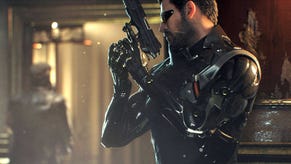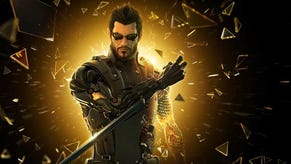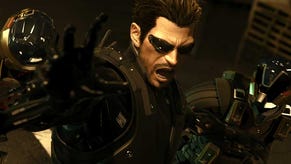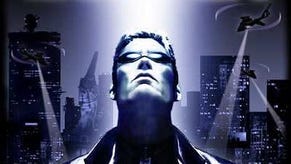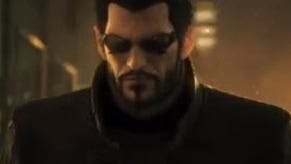Vive la Revolution - JF Dugas on rebooting Deus Ex
In the week Eidos Montreal celebrates its fourth birthday, we speak to Deus Ex: Human Revolution director Jean-Francois Dugas on the rebirth of one of core gaming most beloved series.
It's easy to forget that Deus Ex 3 was announced in 2007 as Eidos Montreal's welcome call to the development community, not at GDC in 2010 at the beginning of an extended awareness drive for the finally-titled Human Revolution.
For game director Jean Francois-Dugas, though, speaking nearly four years after DE3's development was first confirmed, the end is in sight - no matter what the name on the box.
"We're in the last phase of development, which is debugging," says Dugas when asked for a development update.
"It's all about doing the final functioning of the game and things like that. It's all about making sure we can make it and as stable as it can be."
Deus Ex: Human Revolution acts as a prequel to Deus Ex 1, taking place 25 years before the original game. You play as Adam Jensen, a security guard at Sarif Industries, a company that specialises in human augmentation. One night, Adam gets caught up in an attack which leaves him badly injured, and only survives by being turned into a semi-cyborg.
For Eidos Montreal, and particularly for Dugas, Human Revolution is more than just a revival.
"We see Human Revolution as being the kind of a reboot we would approach more like a new IP."
"We see Human Revolution as being the kind of a reboot we would approach more like a new IP," he says, adding that moving the plot to earlier point in time than the original was necessary to make the game stand alone.
"We really wanted to have a fresh start; we wanted to create new characters, revisit the universe and reinvent it in some ways as a new story. It made sense to go back in time," he says.
"We wanted to ground it more in a reality closer to ours, so we didn't want to put it too far in the future. Since transformation was one of the game's main themes, we really wanted to explore the mechanical augmentations, what happened before all the nano technology."
Travelling back in time will be certainly be great for the game's plot, but Deus Ex is far better known for its PC roots rather than previous appearances on PlayStation 2 and Xbox. Human Revolution is a three-way thing, sim-shipping on PC, 360 and PS3. The mouse massive is worried about "dumbing down". Sounds as though it has good reason.
"Yeah, for the console version, we've made sure that you can play the entire game with pressing one button."
He's joking. Dugas is platform-agnostic.
"We look at Deus Ex more from the game's perspective as, 'Is it a PC game or is it a console game?'" he says.
"We really, really wanted to go back to that franchise and try to understand what was so special about it, what made this game a fantastic experience and we wanted to recreate that."
The PC version has been modified, though.
"Of course, on PC we're going to adapt certain aspects of the interface because of the keyboard, mouse and things that would feel more natural. But other than that, it's going to be the same great experience on all the platforms."
Put your hands up for Detroit
At gamescom last year, Dugas and producer David Anfossi showed off a Human Revolution level in a police station in Detroit, Jensen's home city. There, we saw three ways to complete the mission: by using guns, social aspects and stealth.
I was impressed. And I wasn't the only one: Warren Spector, the father of the Deus Ex series, gave thumbs up at the show.
"We showed him part of a Detroit map one day after the event in our booth. We presented the entire demo to him and he was really excited. He had really good comments about it," says Dugas.
"For him, it was really, really special to see the franchise he created being revised by other people.
"We were really scared and anxious about showing him the game, but his response has been very positive. We were really happy with that."
After seeing the demo, I sat down with Anfossi. There, he mentioned he had just started working on Human Revolution DLC with Dugas, calling it an "extension".
Dugas is less forthcoming on the question of post-launch content, though.
"We're focusing on finishing the main game and we don't have anything else to announce," he says. "Maybe he was just inspired."
Whether or not there will be additional content, though, there's little doubt the game's story will be one players will want to continue. Plot has always been a main pillars of the Deus Ex series, but Human Revolution comes at a time where narrative is playing second fiddle to action in many instances. While Dugas constantly stresses the game's slavery to story, he admits that the Deus Ex team planned the gameplay experience of Human Revolution before starting to "hammer" down plot.
"With Human Revolution, we start by thinking about what the experience will be from a gameplay perspective," he says. "The mechanics, the gameplay loops - trying to make sense of all those things.
"But very quickly after that, we already start to hammer what is going to be the story, to brainstorm. And when we have the key points of the story, we go into what we call the blue-print sessions, in which we really start to build all the minute-to-minute gameplay with all the details and pieces of the story.
"We flesh out all of the missions, all the conditions, choices and consequences, all that kind of stuff. Of course it's a game, so gameplay needs to be sharp, but Deus Ex: Human Revolution is very story-driven. Story is as important, in my opinion."
Pulling narrative and gameplay into a single strand was vital for the game's success, the developer says.
"Our blueprint helps us to really blend the two together into one package. We didn't want the players to feel like they were playing the game on one level and the story was being told on another, that those two levels don't talk together.
"We're working those two aspects simultaneously, and we took them very seriously because they're part of the experience of Deus Ex. It's not only about gameplay, nor is it only about story: it's all about all those things together."
While Human Revolution does use cut-scenes for plot-driving - the game includes 50 minutes' worth throughout a "20-something hour" period - Dugas says that most of the story is told through gameplay.
Eidos Montreal "could do some great multiplayer."
While Deus Ex is a story-driven title at heart, the series came close to dallying with multiplayer in the past: Crystal Dynamics made Deus Ex: Clan War for release in 2005, but Eidos shifted the game away from the DE universe after Deus Ex: Invisible War, the second full Deus Ex game, performed below expectations. Clan War eventually released as Project Snowblind, leaving the Ion Storm IP unsullied by online play.
But this is not 2005. We live in a period where multiplayer is essential to most triple A, cross-platform games, yet Human Revolution features nothing apart from a campaign. Dugas doesn't regret the decision, but won't rule multiplay out for the future.
"Reviving Deus Ex is quite a huge challenge on its own already, and Deus Ex, in its heart, is more of a solo experience than anything else," he says.
"Don't get me wrong: we could do some great multiplayer, but we thought, as a first attempt, we should really, really focus into making the best Deus Ex game we could come up with, and not try to spread our efforts all over the place."
While Eidos Montreal may be approaching Human Revolution as a new IP, the developer's obviously aware that deviating too far from the original games' formula would put the project on thin ice. Commitment to narrative has been unswerving, as it has to the IP's RPG component, although Dugas does concede the overall Deus Ex role-playing system has been modernised.
"I think the RPG component of Human Revolution is quite present," he says, but adds that "the shooting was really stats-based" in the earlier titles.
"That's the kind of thing we changed," he says.
"In terms of actual shooting, if you're good at aiming at an enemy, we didn't want to penalise you with that kind of system.
"For us, it's not that it's less RPG; it's just that we move things around a bit, and we just wanted to make sure the combat experience would be a little bit more in-your-face in terms of attention and adrenaline.
"But other than that, I'd say Human Revolution is more RPG than the other games were."
Back to the future?
After Deus Ex, the next big thing from Eidos Montreal will be Thief 4, and if an upcoming panel at GDC next week is any indication, we're about to start seeing more of Square's latest take on an Eidos reboot.
Looking back at Deus Ex and Thief from the old days of Eidos is exciting enough, but what of genuinely new IP? Is it something the Deus Ex team or the studio as a whole is working on? Dugas won't say. And he won't tell us if there's going to be a Human Revolution demo or not, either.
But it doesn't matter. Deus Ex is about to breathe again. Human Revolution, the game first announced in 2007, is set for a release sometime in 2011. The wait, for fans, has been torture. Dugas denies the announcement was too early, though.
"We wanted to let the fans know out there that Deus Ex was coming back. But also, it was a great tool for building the studio and hiring people. I would say that our strategy has been two-fold."
Great for Eidos Montreal: a nightmare for fans. It's easy to forget. It's never easy to wait.
Deus Ex: Human Revoluton releases this year for PS3, 360 and PC.




